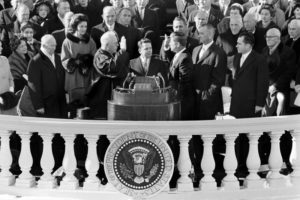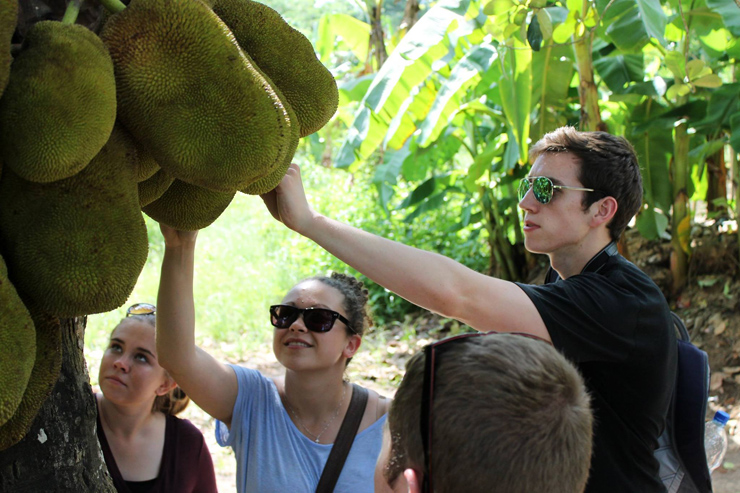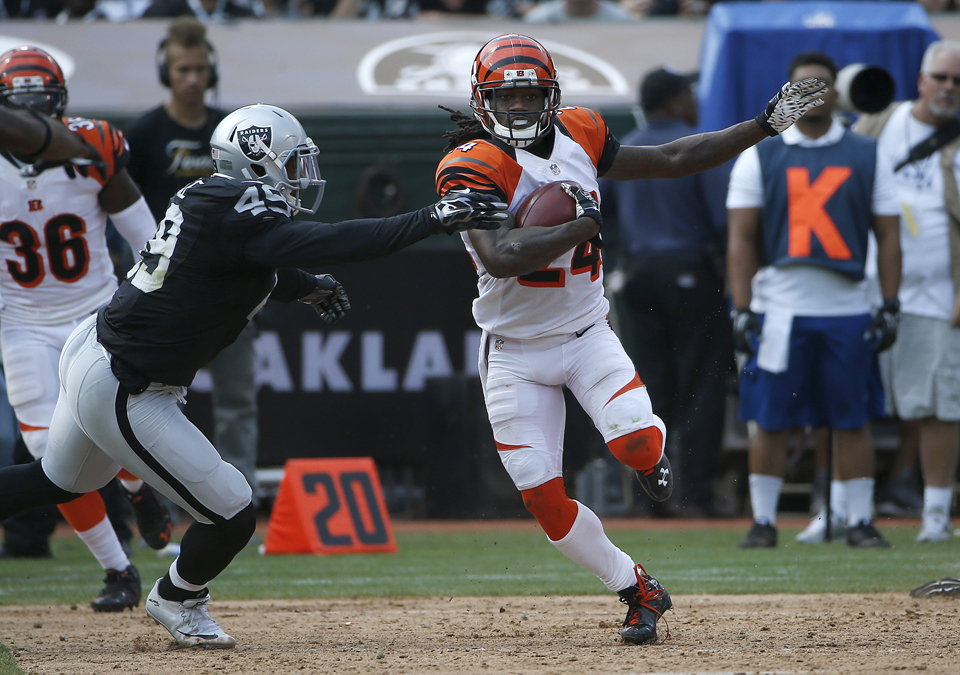

Raymond Arke | News Editor
02/22/18
Most Duquesne students’ parents were only just born in the ’60s, but the turbulent, free-spirited decade forever changed the course of America. This week, The Duke throws it back to flower children, moon shots, battles for far-off jungles and a more perfect union.
United States Elects John F. Kennedy President (1960)
The decade began with hope as JFK became the first Catholic president and the youngest man ever to assume the office. Kennedy won a narrow election over former Vice President Richard Nixon, helped in part by his telegenic quality in the first-ever televised presidential debates. In his inaugural address, Kennedy inspired the youth of the country, spoke of greater public service and pledged to put America on a path of peace during the Cold War.
Berlin Wall Splits the City (1961)
Berlin, Germany had been divided since the end of World War II, with the Soviet Union controlling the Eastern half and America and Allies in the West. Relatively free travel was previously allowed between the two halves, but by 1961, thousands of East Berliners were fleeing to the West each month to escape growing authoritarian control. After escalating tensions between Kennedy and Soviet Premier Nikita Khrushchev, on the morning of Aug. 13, the border between the East and West was shut, and East German troops began building a wall. The Berlin Wall would stand until 1989.
Cuban Missile Crisis (1962)
After a failed CIA-backed invasion of Cuba at the Bay of Pigs in 1961, Khrushchev reached an agreement with Cuban leader and Soviet ally Fidel Castro to place nuclear missiles in the island. As Soviets and Cubans built missile sites, on Oct. 14, a CIA reconnaissance flight took photos of the constructions. The Kennedy administration debated how to respond over the next 13 days, with the military and some Cabinet officials advocating for military and/or nuclear strikes, which would create an all-out war. On Oct. 22, Kennedy said in a speech to the nation that the U.S. would be imposing a naval quarantine on Cuba until the removal of the missiles. Tense days followed as both sides prepared for possible military intervention. On Oct. 26, a secret deal was reached where the U.S. would remove missiles from Turkey, and the Soviets would remove the Cuban missiles. It was the closest the two powers would get to a nuclear war.
March on Washington (1963)
As the civil rights movement had been growing throughout the American South with numerous sit-ins and boycotts, a massive demonstration was planned for Aug. 28, 1963, to create more legislative changes. Between 200,000 to 300,000 people, the majority African American, turned out to create one of the largest protests in American history. The march was highlighted by the “I Have a Dream” speech by Martin Luther King Jr. The event, covered extensively in the press, increased public support of the movement and laid the groundwork for the Civil Rights Act of 1964.
Kennedy is Assassinated (1963)
During a reelection stop in Dallas on Nov. 22, Kennedy rode in a convertible through the city. As his motorcade drove through the streets, Lee Harvey Oswald, a former Marine and one-time defector to Russia, opened fire on Kennedy’s car. One bullet hit and wounded John Connally, the governor of Texas. The other two shots hit Kennedy, one fatally. Kennedy died at 1 p.m. shortly after undergoing surgery in a Dallas hospital. Vice President Lyndon Johnson was sworn in as president aboard Air Force One at 2:38 p.m. Oswald escaped from the scene and was arrested in a movie theater after fatally shooting a police officer. On Nov. 24, as Oswald was being transported from police headquarters to the county jail, Jack Ruby, a Dallas nightclub owner, shot and killed him. Kennedy’s killing was a national tragedy.
The Beatles Perform The Ed Sullivan Show (1964)
Already a massive hit in Britain, the quartet from Liverpool arrived in America on Feb. 7 and were met at the airport by thousands. On Feb. 9, The Beatles performed on the popular music variety show The Ed Sullivan Show which served as their formal introduction to the American audience. That episode was watched by around 34 percent of the population. So-called “Beatlemania” ensued, and the band would go on to dramatically alter the way music is recorded and performed.
Gulf of Tonkin Incidents, Vietnam War Begins (1964)
Since the arrival of 900 military advisors to South Vietnam in 1961, the U.S. had been involved in protecting the country from invasion by the Communist North and from the Viet Cong, Communist guerrillas. On Aug. 2, a U.S. destroyer was performing intelligence work off the coast of North Vietnam when it engaged in a skirmish with several North Vietnamese ships. On Aug. 4, an erroneous report was received that two U.S. destroyers had been attacked by the North Vietnamese again. No such event occurred. However, President Johnson gave a televised speech asking for greater military authority from Congress and ordered bombing strikes on North Vietnamese targets. Six days later, Congress passed the Gulf of Tonkin Resolution, which gave Johnson the power to “take all necessary steps, including the use of armed force,” in Vietnam signaling the true beginning of the Vietnam War.
The Great Society/Civil Rights Act of 1964 (1964)
As president, Johnson would introduce a variety of new domestic programs that were designed to help create a more equal America. Some of the notable programs included Medicare and Medicaid, expanding food stamps and creating the Public Broadcasting Service (PBS) and National Public Radio (NPR). The Civil Rights Act of 1964 banned segregation and job discrimination.
The “Summer of Love” (1967)
During the summer months of 1967, the hippie subculture that had been flourishing exploded as nearly 100,000 young people flooded the Haight-Ashbury neighborhood of San Francisco. Haight-Ashbury had become the center of the counterculture, with many hippies staying in the area after the Monterey Pop Festival. Psychedelic drug use was common. It would set the stage for the Woodstock Music Festival in 1969. The summer solidified San Francisco and California as the center of hippie culture.
The Tet Offensive (1968)
With the Vietnam War dragging on since 1964, the military and the Johnson Administration promised a “light at the end of the tunnel” in Vietnam. American troops had been increasing each year, and the public was assured America was winning. On Jan. 27, a seven-day truce was made with the North Vietnamese Army (NVA) to celebrate the Vietnamese New Year festival of Tet. However, on Jan. 30, the NVA and the Vietcong guerilla forces launched massive surprise attacks on more than 30 cities throughout South Vietnam, including the heavily fortified capital of Saigon. American and South Vietnamese soldiers were initially caught off guard by the vastness of attacks; yet, they recovered and took back the cities by the end of February, marking a military failure for the Communists. The offensive was covered extensively on TV, and the American public saw that the war was far from over.
Martin Luther King Jr. and Robert Kennedy Assassinated (1968)
Leading Civil Rights activist and Nobel Peace Prize winner Martin Luther King Jr. was in Memphis in April 1968 to support the strike of African American sanitation workers. On April 4, a day after delivering his famous “I Have Been to the Mountaintop” speech, King was shot on the balcony of his motel and killed. The assassin was James Earl Ray, an escaped convict. One of the attendees at King’s funeral was 1968 Democratic presidential candidate Robert Kennedy, brother of the slain president. Kennedy’s run for the Democratic nomination was based around ending the Vietnam War, extending civil rights and helping the poor. On June 5, Kennedy won the California primary and after addressing supporters at the Ambassador Hotel, was fatally shot by dishwasher Sirhan Sirhan. The death of two national figures within months of each other shocked a fragile nation.
Humans Land on the Moon (1969)
On July 21, in front of an international televised audience, two Americans became the first humans to walk on the Moon. The Apollo 11 space flight successfully landed Buzz Aldrin and Neil Armstrong on the lunar surface, cementing American dominance in the Space Race against the Soviet Union. It was one of the most pivotal moments in world history: “A giant leap for mankind,” to quote Armstrong.




